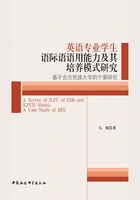
1.4 Organization of the book
The present research is mainly guided by the following three questions:
1.What is the current situation of the IL pragmatic development of English majors in ethnic universities?
2.What problems and weaknesses are there in the ethnic minority English majors' development of their IL pragmatic competence?
3.How can the problems and the weaknesses identified be dealt with?
This book consists of six chapters.Chapter One briefly introduces the research background,the research method used as well as the organization of the book.Chapter Two outlines the theoretical tenets of the present study,including the notion and rationale of interlanguage,interlanguage pragmatics,intercultural communication,pragmatic transfer,pragmatic fossilization,and pragmatic failure in FLL.Related to the previous chapter,Chapter Three highlights the terminal goal in IL pragmatic competence development,i.e. accuracy,fluency,appropriacy,and intercultur-al pragmatic sensitivity,which in turn function as the criteria for us to evaluate any language users' IL pragmatic competence.Chapter Four describes the process of the investigation,including the selection of participants,data collection instruments,the data collection procedures and the establishment of data analysis framework.The results of the investigation are discussed by taking the quantitative approach and the qualitative approach respectively.Based on the results and discussion of the previous chapter,Chapter Five proposes a tentative themed-based IL pragmatic competence development model for ethnic minority English majors in accordance with six strategies in practice,namely,(1)applying explicit-implicit teaching method,(2)offering theme-based contextualized metapragmatic cues,(3)highlighting instructional interaction and strategic perception and bearing in mind the development of learners pragmatic awareness throughout,(4)combining in-class instruction with out-of-class learning,and offering feedback and proper correction,if necessary,(5)restoring the legitimate position of grammar teaching by foregrounding its salient communicative function,and(6)specifically developing learners' learning strategies.To balance accuracy and fluency together with appropriacy and intercultural pragmatic sensitivity expounded in Chapter Three,the systematic principle,the integrative principle,the practical principle,the individual difference principle,the cognitive principle,the interlingual and intercultural contrastive principle,and the discoursal teaching principle should be followed in the themed-based grammar teaching.The last chapter,Chapter Six,summarizes the findings and makes suggestions,in which issues such as teacher(s)training and the requirements for native international teachers,textbook compilation,language input and CALL teaching,learners' habit and autonomous learning,in ethnic universities,are discussed and shortcomings of the present research are pointed out and research possibilities for future study are suggested.
[1]I prefer education to learning.In comparison with language learning,language education is supposed to embrace both the acquisition of the target language per se and that of the target culture,imparting the method or the way to have a life-long learning.Otherwise it is ready to be misleadingly regarded as language training,say,by nonprofessionals,school leaders,the so-called languists,a term analogous with languistics,coined by Nelson Brooks in the early 1960s.
[2]This quotation is from Professor He Zhaoxiong's summer lecture addressed in Oxford Hall,SISU in 2001.
[3]Crosslinguistic influence is a term which includes such phenomena as“transfer”,“interference”,“avoidance”,“borrowing”and L2-related aspects of language loss (Sharwood-Smith & Kellerman,1986:1).